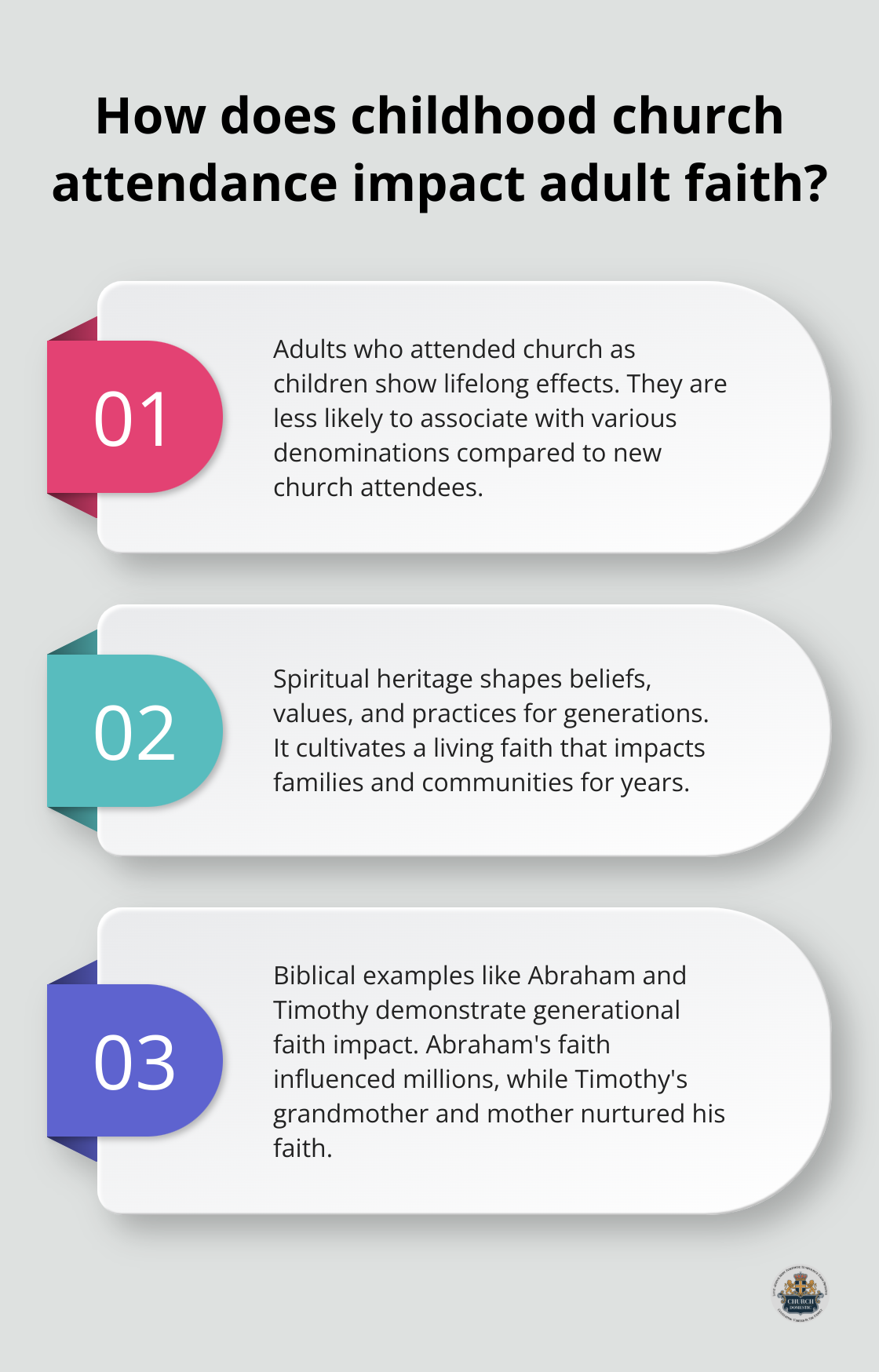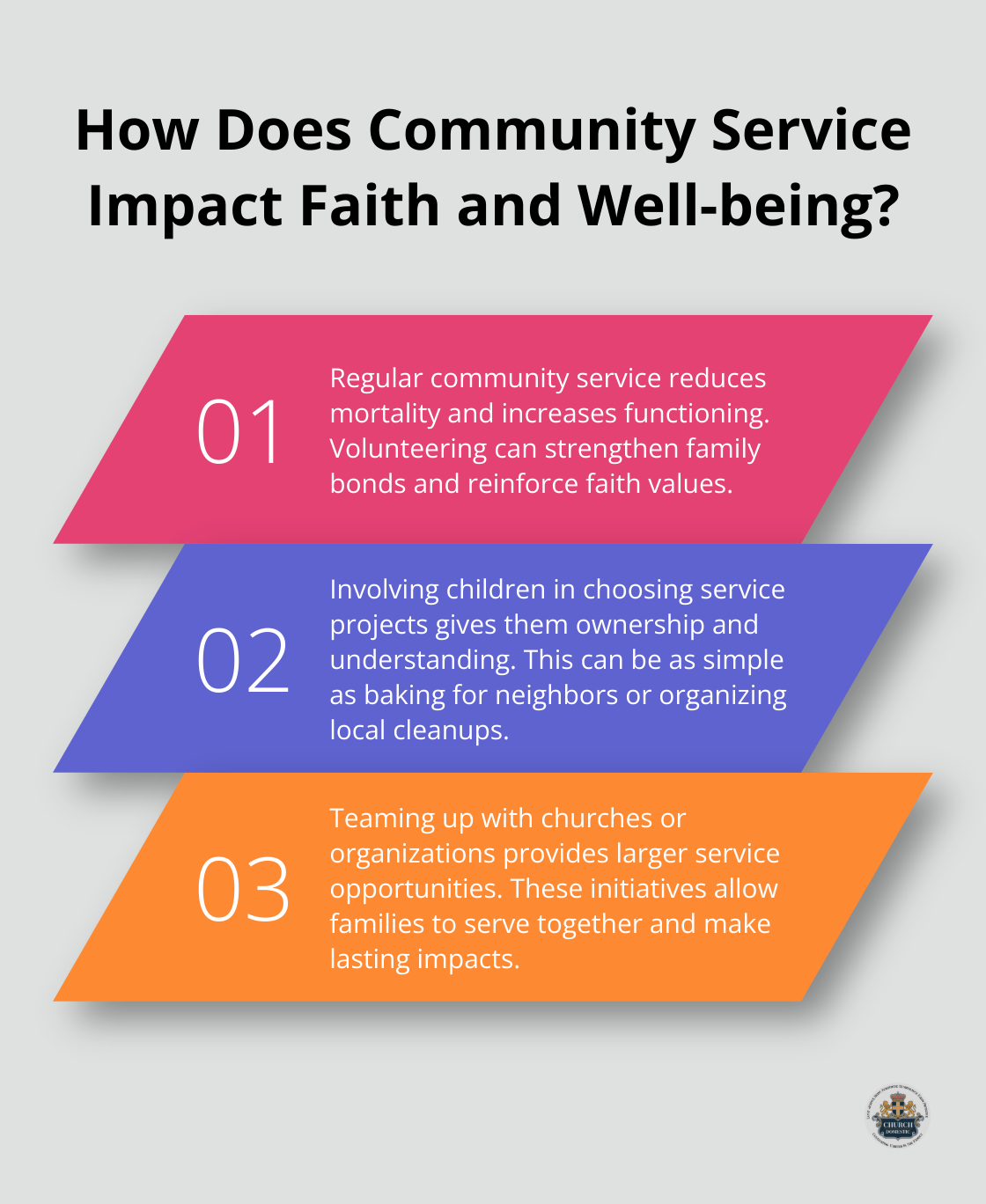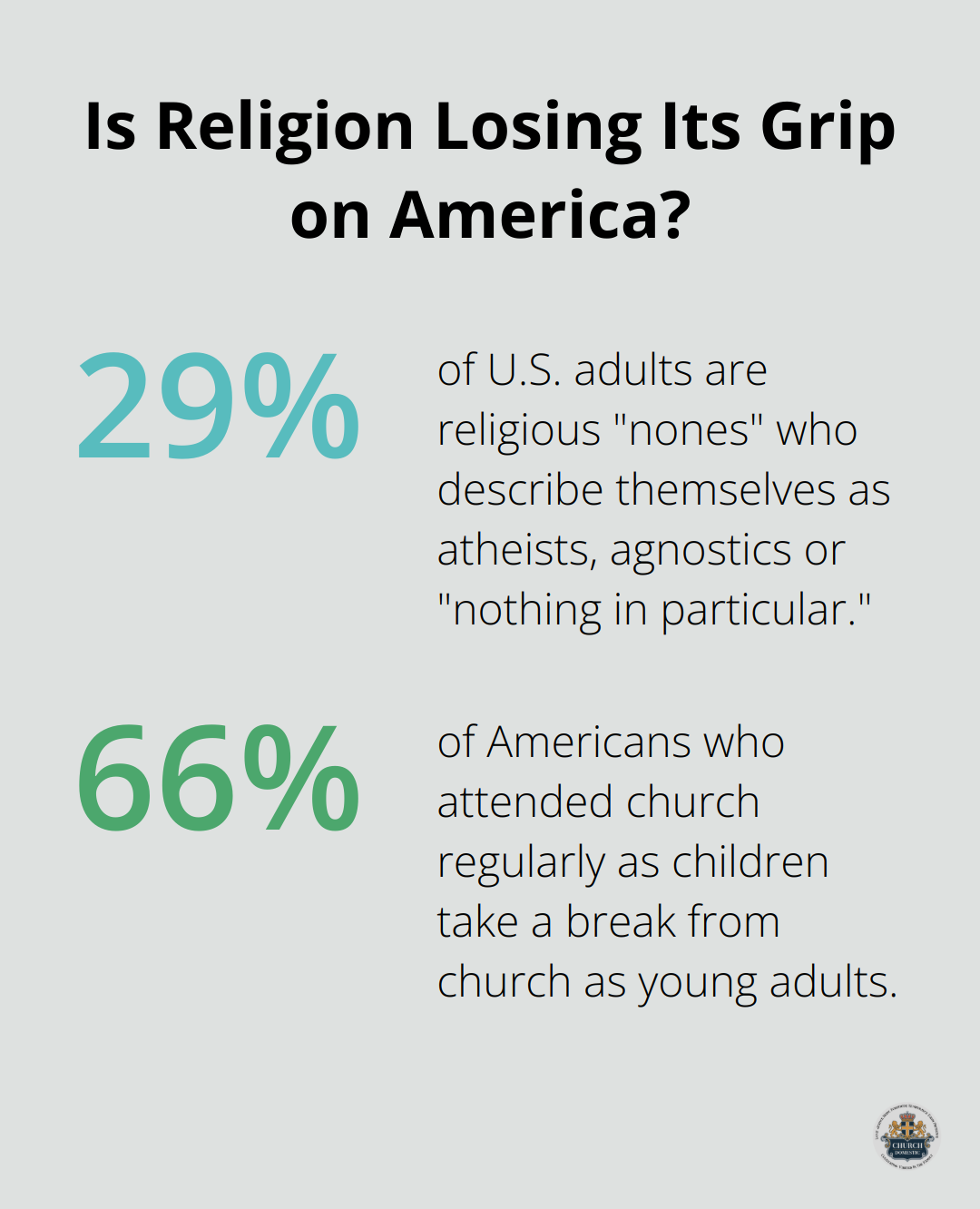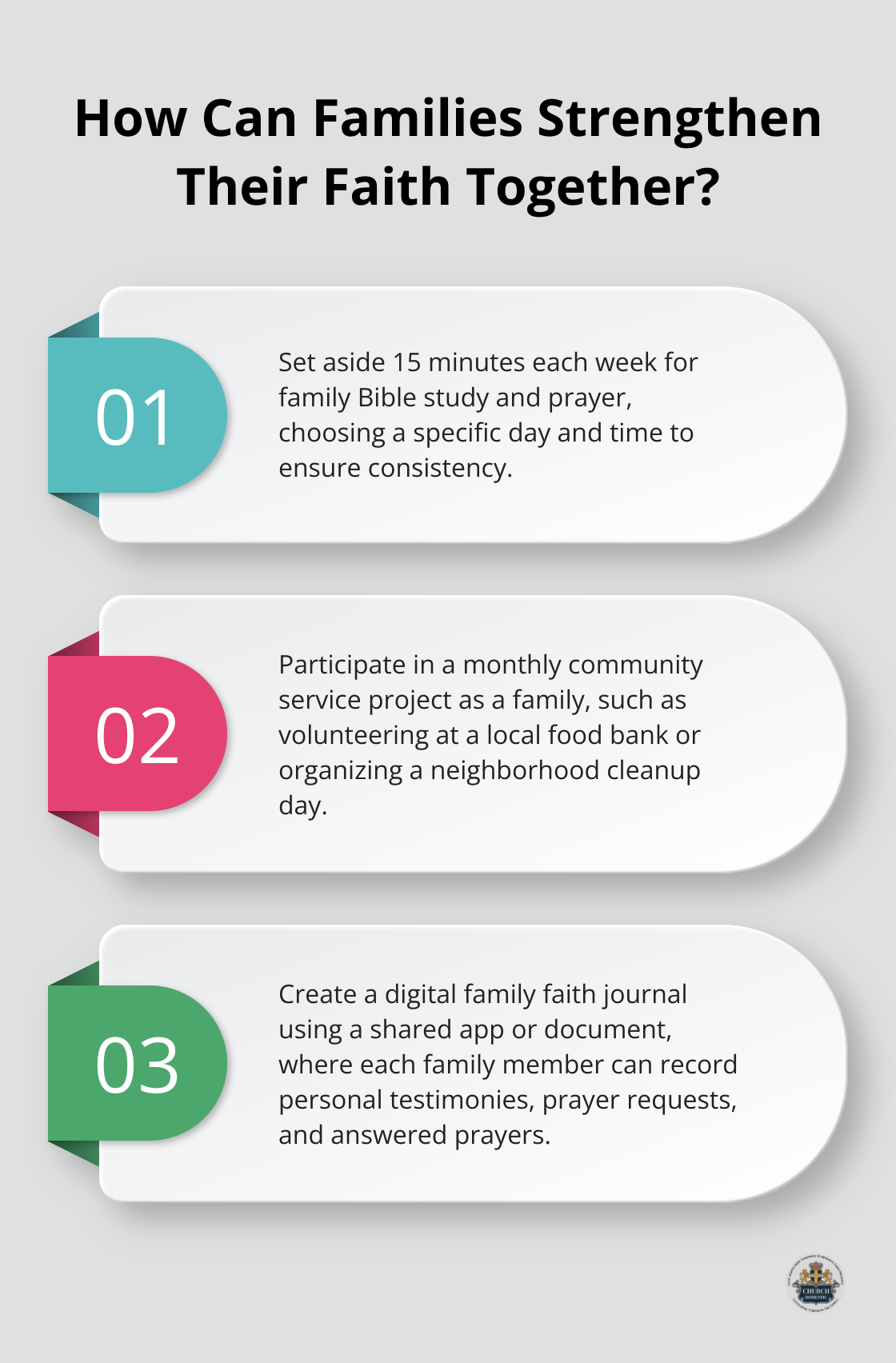At Church Domestic, we believe in the power of a faith legacy that spans generations. Building a spiritual heritage is more than just passing down traditions; it’s about cultivating a living, breathing faith that impacts families and communities for years to come.
In this post, we’ll explore practical steps to create a lasting spiritual legacy and navigate the challenges that come with it. Whether you’re just starting your journey or looking to strengthen your family’s faith foundation, we’re here to guide you through the process.
Why Spiritual Heritage Matters
Defining Spiritual Legacy
Spiritual heritage forms the bedrock of a family’s faith journey. It shapes beliefs, values, and practices that can endure for generations. This legacy isn’t just about passing down traditions; it’s about cultivating a living, breathing faith that impacts families and communities for years to come.
Biblical Examples of Generational Faith
The Bible brims with examples of faith passed down through generations. Abraham’s unwavering trust in God’s promises not only affected his immediate family but also laid the groundwork for the entire nation of Israel. This legacy of faith continues to influence millions of believers today.

Another powerful example is Timothy in the New Testament. His grandmother Lois and mother Eunice nurtured his faith (as mentioned in 2 Timothy 1:5). This multi-generational approach to faith-building resulted in Timothy becoming a key leader in the early church.
Measurable Impact on Families
Research supports the significance of spiritual heritage. Adults who are new to church attendance are more likely than adults who were churched as kids to associate with churches of various denominations.
Building Resilient Communities
The impact of spiritual heritage extends beyond individual families. Communities with strong faith foundations often demonstrate greater resilience in times of crisis. For example, during the COVID-19 pandemic, many churches reported an increase in community outreach and support initiatives, showcasing the practical application of faith-based values.
Practical Steps to Start Your Legacy
- Family Devotions: Set aside time each week for family Bible study and prayer. Even 15 minutes can make a significant difference.
- Service Projects: Participate in community service as a family. This not only helps others but also reinforces the importance of living out your faith.
- Storytelling: Share personal testimonies and family faith stories. These narratives can become powerful tools for connecting younger generations to their spiritual roots.
- Create Traditions: Establish faith-based family traditions around holidays or milestones. These can become cherished practices that reinforce spiritual values (and create lasting memories).
Spiritual heritage requires intentionality and commitment. These steps don’t just influence your immediate family; they potentially shape the faith of generations to come. As we move forward, let’s explore the practical steps to build a lasting spiritual heritage that will stand the test of time.
How to Build a Lasting Spiritual Legacy
Building a spiritual legacy that stands the test of time requires intentional action and consistent effort. Here’s how you can start building your own spiritual legacy today.
Cultivate Personal Growth
Your spiritual legacy begins with you. Commit to daily prayer and Bible study. Set up intentional times to pray during the day. Use a Bible reading plan or devotional app to stay on track. Write your thoughts and insights in a journal to deepen your understanding and track your growth over time.

Attend workshops or seminars to expand your knowledge. Many churches offer free or low-cost classes on various aspects of faith. Take advantage of these opportunities to grow and learn.
Establish Family Faith Rituals
Create regular family worship times. This could be as simple as a 10-minute devotional before dinner or a longer Bible study session on Sunday afternoons. Consistency is key. If you miss a day, don’t give up – just pick up where you left off.
Add faith to daily routines. Say grace before meals, pray together before bedtime, or start the day with a short scripture reading. These small habits can have a big impact over time.
Celebrate religious holidays and milestones with special traditions. Create a Thanksgiving gratitude jar, light Advent candles, or have a special family communion service on Good Friday. These unique traditions will become cherished memories that reinforce your family’s faith values.
Participate in Community Service
Put your faith into action through regular community service. Find a local food bank, homeless shelter, or other charity where your family can volunteer together. Regular community service has been found to have benefits including reduced mortality and increased functioning.
Include your children in choosing and planning service projects. This gives them ownership and helps them understand the importance of helping others. It could be as simple as baking cookies for elderly neighbors or organizing a neighborhood cleanup day.
Team up with your church or local organizations for larger service initiatives. Many groups organize mission trips or community outreach events that provide excellent opportunities for families to serve together and make a lasting impact.
Share Your Faith Story
Don’t underestimate the power of personal testimony. Share your own faith journey with your children (including both triumphs and struggles). This honesty can help them relate to your experiences and see faith as a real, living part of life.
Encourage your children to share their own faith experiences. Create a safe space for them to ask questions and express doubts. This open dialogue can strengthen their faith and deepen your family’s spiritual connections.
Invest in Faith-Based Education
Consider faith-based educational options for your children. This could include Sunday school, vacation Bible school, or even Christian schools. These environments can reinforce the values you’re teaching at home and provide additional spiritual mentors for your children.
As you implement these practices, remember that building a spiritual legacy takes time and patience. The seeds you plant today may not bear fruit for years to come, but your consistent efforts will shape the faith of future generations. Now, let’s explore how to overcome some common challenges in passing down faith to the next generation.
Navigating Faith Challenges Across Generations
Bridging the Generational Divide
Today’s youth often view faith differently than their parents or grandparents. A 2018 Barna study found that 59% of Gen Z Christians say church involvement is not important to them. To bridge this gap, we need to adapt our approach.

Engage in open dialogue instead of lecturing. Ask your children or grandchildren about their views on faith. Listen without judgment. Share your own experiences, including times of doubt or struggle. This honesty can foster trust and make faith feel more relatable.
Use technology to your advantage. Many young people prefer digital platforms for learning and connection. Explore faith-based apps or online communities together. The YouVersion Bible app offers reading plans you can do as a family (fostering discussion and shared growth).
Countering Secular Influences
In a world saturated with secular media, maintaining faith can challenge families. About three-in-ten U.S. adults (29%) are religious “nones” – people who describe themselves as atheists, agnostics or “nothing in particular.” To counter these influences:
Be proactive in media choices. Watch faith-based films or documentaries as a family. Discuss the themes and how they relate to your beliefs. Websites like Plugged In offer reviews of popular media from a Christian perspective (helping you make informed choices).
Encourage critical thinking. When you encounter secular viewpoints, don’t simply dismiss them. Instead, use them as opportunities for discussion. Help your children develop the skills to analyze different perspectives through the lens of faith.
Embracing Doubts and Questions
Doubt is a natural part of faith development. A 2017 study by LifeWay Research found that 66% of Americans who attended church regularly as children take a break from church as young adults. Instead of fearing doubt, see it as an opportunity for growth.
Create a safe space for questions. Set aside time each week for a family Q&A session about faith. No question should be off-limits. If you don’t know an answer, research it together.
Seek out resources for tough questions. Books like “The Case for Christ” by Lee Strobel or “Mere Christianity” by C.S. Lewis offer thoughtful explorations of faith that can spark meaningful discussions.
Final Thoughts
Building a faith legacy spans generations and impacts families for years to come. We encourage you to start your journey today by taking small, consistent steps towards personal growth and family faith rituals. Your actions will shape the spiritual heritage of future generations, even if you don’t see immediate results.

Challenges will arise, but they present opportunities for deeper connections with your loved ones. Open dialogue and critical thinking will strengthen your family’s faith foundation as you navigate generational differences and address doubts together. Every effort counts in this rewarding process of creating a lasting spiritual legacy.
At Church Domestic, we support families in their spiritual journey with resources and guidance. We invite you to visit our website at Church Domestic for more information on family life, faith, and enjoying life to the fullest. Together, we can build a faith legacy that stands the test of time and positively influences generations to come.